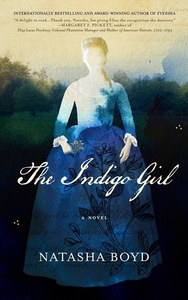Take a photo of a barcode or cover
Near the end of the book the date is 1741. The protagonist uses the phrase “no harm, no foul”, which was coined in the 1950s in reference to US basketball. This was an absurd mistake to make.
The race issues are cringe-worthy. How could a slave prioritize his chance at freedom over her beloved indigo crop? He’s a childhood friend! He knows how much this means to her! Throughout, her perception of herself as a benevolent slave owner is meant to be taken seriously. Even as she retreats to the comforts of her home, made comfortable by her slaves. The irony is lost on the author.
Beyond that, it’s another tale of a young woman who regrets not being a boy. As it is, her family needs to marry her off, to the Indigo Girl’s great dismay. Sound familiar? Yeah. It did to me too. Same old, same old. Except this time indigo was part of the picture.
The race issues are cringe-worthy. How could a slave prioritize his chance at freedom over her beloved indigo crop? He’s a childhood friend! He knows how much this means to her! Throughout, her perception of herself as a benevolent slave owner is meant to be taken seriously. Even as she retreats to the comforts of her home, made comfortable by her slaves. The irony is lost on the author.
Beyond that, it’s another tale of a young woman who regrets not being a boy. As it is, her family needs to marry her off, to the Indigo Girl’s great dismay. Sound familiar? Yeah. It did to me too. Same old, same old. Except this time indigo was part of the picture.
informative
medium-paced
Plot or Character Driven:
A mix
Strong character development:
No
Loveable characters:
Yes
Diverse cast of characters:
No
Flaws of characters a main focus:
No
I liked this will enough but nothing really stood out about it. I thought it ended abruptly. The afterword was one of my favorite parts with all of the historical details.
adventurous
emotional
informative
inspiring
fast-paced
Plot or Character Driven:
A mix
Strong character development:
No
Loveable characters:
Yes
Diverse cast of characters:
Yes
Flaws of characters a main focus:
No
I wanted to read this book because I am moving to South Carolina and because I am a historical fiction nerd. The story of Eliza Lucas was fascinating, but the story of the enslaved people working on her plantation seems to me to be less historical and more revisionist. The enslaved characters want to help Eliza - it is a team effort to grow indigo - she refers to them only as “servants” and nicknames them, teaching some men how to read. The way this book is written suggests that Eliza was a “good” slaveowner and almost glorifies the institution of slavery...I say, there is no such thing as a good slaveowner, and this book borders on suggesting that “slavery wasn’t all bad.” No thank you.
challenging
dark
emotional
informative
inspiring
mysterious
reflective
sad
tense
medium-paced
Plot or Character Driven:
A mix
Diverse cast of characters:
Complicated
Flaws of characters a main focus:
No
Graphic: Death, Hate crime, Physical abuse, Racism, Slavery, Violence
Moderate: Rape, Sexual violence, Suicidal thoughts
Well researched historical fiction based on Eliza Lucas. Set during the 18th c and interesting to learn about the importance of indigo.
adventurous
informative
inspiring
reflective
medium-paced
Plot or Character Driven:
A mix
Strong character development:
Yes
Loveable characters:
Yes
Diverse cast of characters:
Yes
Flaws of characters a main focus:
Complicated
challenging
emotional
tense
medium-paced
Plot or Character Driven:
A mix
Strong character development:
Yes
Loveable characters:
Complicated
Diverse cast of characters:
Yes
Flaws of characters a main focus:
Yes
medium-paced
adventurous
challenging
emotional
informative
inspiring
medium-paced
Plot or Character Driven:
Character
Strong character development:
Yes
Loveable characters:
Yes
Diverse cast of characters:
Yes
Flaws of characters a main focus:
No
My latest read for book club. Great read and it is based on a true event. It's hard to imagine that 16 year old Eliza is put in charge of her family's 3 plantations in 1739, but that is exactly what happened! I realize this is a fictional account of true events, but the author does a fabulous job weaving a story that is compelling. She includes excerpts from Eliza's personal letters which definitely adds to the story. Eliza is written as a brave young woman who is not afraid to fight for what she believes in. And although this is a fictional account, I have to believe that Eliza was strong in character and did not back down-otherwise IRL, her father would have just hired an overseer for their plantations. This story was fascinating to me and I want to know more about this remarkable woman.
Moderate: Slavery




